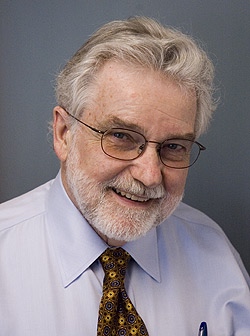
Joseph J. Duggan
Professor of French and Comparative Literature, Emeritus
Professor of the Graduate School
Distinguished medievalist Joseph John Duggan, “Joe” to everybody, passed away on October 2, 2016, after a two-year battle with Parkinson’s Disease.
One of four children born in Philadelphia on August 8, 1938, to an Irish-American father and an English-American mother, Joe was a precocious student who latched onto language study early: by the end of high school, he had devoted eight cumulative years of study to Latin, Greek, and German, and was eager to continue his study of the classics at Fordham University. It was through a junior year abroad scholarship that he had the opportunity to study in France, whose language he had not previously studied. Medieval French and Occitan particularly captured his imagination, and after graduation he attended Ohio State University, expressly to study troubadour poetry with specialist Alexander Herman Schutz. Within four years he had completed a dissertation examining the specificities of poetry crafted for oral delivery. Immediately, in 1964, Joe was hired as an instructor in the Department of French at the University of California, Berkeley, before his appointment as assistant professor the following year. Navigating a notoriously contentious patch in departmental history, and becoming cross-appointed with the Department of Comparative Literature in 1966, Joe was awarded tenure in 1971. He retired in 2005 but was then recalled to work in the Graduate Division until 2011.
A pioneering practitioner of what would eventually be called Digital Humanities, Duggan recognized that computer concordances could be a boon in tracking the reappearance, in epic literature, of the “formulas” that were held by Milman Parry to be a mark of poetry composed initially for oral delivery. The result was three books—a concordance of the foundational French epic La Chanson de Roland (1969), a monograph, The “Song of Roland”: Formulaic Style and Poetic Craft (1973), and an edited volume of essays entitled Oral Literature: Seven Essays (1975). His abiding interest in the Chanson de Roland eventually culminated in his spearheading of the transcription and publication of all extant manuscripts of the text—a 20-year, seven-part, three-volume undertaking by seven leading scholars, including Duggan’s wife, Dr. Annalee Rejhon: La Chanson de Roland-The Song of Roland: The French Corpus (2005). Joe’s wide-ranging expertise also resulted in two further major monographs, Cantar de mio Cid: Poetic Creation in its Economic and Social Contexts (1989) and The Romances of Chrétien de Troyes (2001). Joe authored over 50 articles in addition to these monographs and assorted other bibliographies, editions, and translations. Awarded Guggenheim and National Endowment for the Humanities fellowships (the latter twice), he was fittingly asked in 1985 to deliver the First Annual Milman Parry Lecture in Oral Literature and Tradition at the University of Missouri. Between 1999 and 2003, he held the Bernie E. Williams Chair in Comparative Literature. Joe was an important figure in the broader medieval studies community on campus, particularly as other medievalists were grappling with the oral/literary interface where he was a pioneer. Joe was also part of the Celtic Studies Program’s community and became a regular attender and supporter of the California Celtic Conference, founded by his wife, Annalee, which reached its 41st iteration in 2019.
In addition to his professional success as a scholar in medieval European cultures and literatures, Joe was an inspiring teacher who fascinated generations of undergraduates. More impressive, perhaps, was the extensive impact he had upon his graduate students: In his decades at Berkeley, he directed some 30 Ph.D. dissertations in the departments of French and comparative literature and served on countless doctoral qualifying examinations for students representing nearly all of the departments participating in the Medieval Studies Program. His great success was certainly due to his generosity, compassion, and openness as a mentor. Several of his Ph.D. students went on to professorships in top universities in the U.S. and in Britain, as well as to significant publishing careers.
For 24 years Joe served as associate dean of Berkeley’s Graduate Division; his purview included admissions and degree requirements, appointments as graduate student instructors (GSIs) and graduate student researchers (GSRs), and preparation of GSIs for teaching, including the controversial unionization of Berkeley’s GSIs. His title as associate dean belies his influence in the Graduate Division where Joe was the mentor to three deans: Joseph Cerny (1985-2000), Mary Ann Mason (2000-2007), and Andrew Szeri (2007-2014). Of the many powerful ethical principles Joe brought to his administrative role, one stands out as enduring: his conviction that the Academic Senate was the sole source of governing principles, and that administrators derive their authority from the Senate. In the context of the Graduate Division, for example, Joe felt that the Graduate Council was the source and arbiter of his actions as associate dean. A further expression of his moral values followed from his role as associate dean encompassing student life: Joe was unconditionally committed to the success of imperfect students. His reputation amongst all who engaged him was one of fairness, with compassion to those facing difficulties. Joe once told one of us, “Rules define the character of the institution; exceptions the character of its leaders.” Deans, department chairs, and countless faculty members and graduate students regarded Joe as an exceptionally fair-minded and effective administrator.
Joe Duggan’s leadership leaves one very specific legacy, the GSI Teaching and Resource Center established under his direction in 1989 via authority from the Academic Senate. Three decades later, this center serves thousands of GSIs per year in preparing for teaching in the context of scholarship on student learning. Joe recognized from the very beginning that teaching is a critical component of graduate education, and that learning is informed by substantial scholarly literature. In his role as associate dean, he saw to it that this center was launched with a learned director and overseen by a standing subcommittee of the Academic Senate’s Graduate Council.
Jeffrey A. Reimer
Nicholas Paige
Eve E. Sweetser
2019
